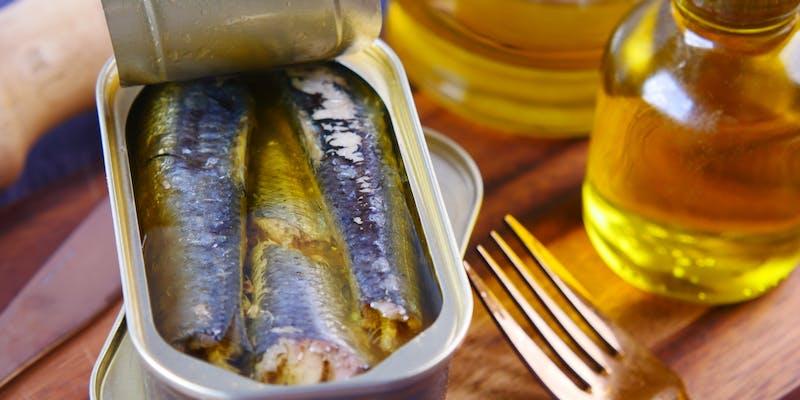Balancing the Health Benefits and Risks of Regular Sardine Consumption
Feb 20, 2024 By Madison Evans
Sardines are petite, nearly 10-inch-long (25 centimeters)-cautionary-deep fish. Globally, they inhabit collectives called schools in the oceans. While tinned or grilled, sardines' tender, oily flesh can also be prepared in various other ways. Sardines have long been traditional in Mediterranean, Indian, Philippine, and Portuguese cuisines.
High omega-3 fatty acid content in fish reduces behavioral issues and cardiovascular disease. Chopped sardines contain water, oil, tomato juice, and other substances. Dress them with spicy sauce, mayonnaise, or mustard, or eat them plain with scallions or peppers. Heads are normally cut, although meat and bones are edible. Health benefits are there.
Benefits Of Consuming Sardines

Reduces Risk of AMD
Age-related macular degeneration (AMD), as documented in a fact sheet by the National Eye Institute (NEI), is predominantly observed in people fifty or older. The progression of vision loss occurs as macular and retinal degeneration initiate. NEI and the European Journal of Clinical Nutrition concur that consuming fish such as sardines may decrease the likelihood of developing AMD.
Anti-cancer Properties
In one cancer report, various research hypothesized that calcium and vitamin D supplements may be of great assistance in preventing breast cancer and other types of cancer. Publication of the report in the Journal of the National Cancer Institute followed. Canned sardines possess a notably elevated concentration of calcium and vitamin D. However, additional research and clinical trials are still necessary.
Antioxidant Benefits
Selenium in sardines protects organs from free radicals. This is health game-changing evidence, not merely encouraging. If free radicals were pollution, your body would look like this. Like municipal sanitation workers, Selenium maintains things clean. Sardines supply 60–70% of the daily selenium requirement in one can. Given how easily sardines can be eaten, this is a serious worry. Your body gets a huge antioxidant boost from them in a salad or straight from the can. Selenium-rich foods like sardines are suggested for long-term health due to the global prevalence of cardiovascular disease and cancer.
Strengthening Bones
Together, sardines and calcium strengthen bones. Since it's one of the few naturally occurring minerals, calcium's importance in skeletal health isn't surprising. Healthy bones can be achieved by exercising and eating anchovies. Age worsens osteoporosis, as you know. It makes millions of people more prone to breakage and weak bones. Sardine is another easy and tasty option. With 3.75 ounces, sardines provide 35% of your recommended calcium. All this and vitamin D, which helps the body absorb calcium, make for strong bones.
Boosts Immune System
Sardines may increase immunity. The Journal of Nutrition reports that sardine fish oil may boost immunological cells. This is the body's primary defense against dangerous bacteria, viruses, and other illnesses. Colds and flu can knock one out for days. Considering the preceding hazards, imagine what your immune system could do. This makes canned sardines essential. They feed and boost the immune system. In a time when health is more critical than ever, adding sardines to your shopping list could make a significant difference.
Helps With Skin Care
Sardines can get near to your skin. Their healthy lipids help skin cells operate. Sardines may be the answer to wrinkle-free, bright skin. Fish rich in omega-3 fatty acids reduce inflammation and may prevent skin aging. Saladinines are an economical, scientifically proven alternative to personal care products costing billions. Edible sardines may improve skin elasticity, moisture, and health. Consider that a can of sardines may be the key to bright skin while choosing between expensive lotions.
Betters Heart Health
Because cardiovascular diseases kill most people worldwide, heart health is crucial. However, frequent consumption of sardines' omega-3 lipids may save lives. Fats lower blood pressure and cholesterol, reducing myocardial infarction and cerebrovascular accidents. Studies show that omega-3s are essential for heart health. Sardines also provide well. The benefits of sardines are that they are tasty and good for your heart when eaten regularly. Sardine consumption can improve cardiovascular health with a simple tweak.
Insulin Resistance
High insulin resistance is a major diabetes indication. Insulin resistance reduces insulin usage. Thus, blood glucose is usually high. A 2012 International Journal of Molecular Medicine study reveals sardine protein may help fructose-induced metabolic syndrome. They affect hyperglycemia, insulin resistance, hyperlipidemia, oxidative stress, and inflammation.
Potential Risks of Eating Sardines

Mercury Poisoning
Mercury, prevalent in fish such as sardines, is one of the most harmful contaminants. Extreme mercury exposure can cause developmental difficulties in young children and severe damage to the nervous systems of adults. Nevertheless, a substantial body of research has determined that the minute quantity of mercury found in sardines does not significantly endanger individuals, including pregnant women who were previously cautioned against fish consumption because of potential contaminants, with no discernible danger.
High Blood Pressure
Sardinium is prevalent when considering the benefits of sardines in cans. Sodium is found in one can and accounts for approximately 12% of the daily value, totaling 282 milligrams. Because sodium increases blood volume and attracts water, individuals with hypertension should restrict their sodium consumption. Although it is acceptable to consume table salt (sodium chloride) in moderate amounts, usage should be limited. Sodium intake can be maintained while enjoying sardines through portion control and preparing the remaining portion with salt substitutes.
Gout
Phosphoric acid crystallizes in the joints of gout patients, leading to pain in the affected joints. As purines, a class of chemicals that degrade into uric acid, are restricted in diet, the most effective gout treatment is a restricted purine intake. Anchovies and benefits of sardines, among other fatty fish, are rich in purines—additional advantages to incorporating fish into your diet if you have gout. Fish oils or white-fleshed fish, such as cod, may be utilized as alternatives.
Kidney Stones
Uric acid, which is the etiology of gout, has the potential to induce kidney stones. Sardinium consumption is contraindicated for those at risk of developing kidney stones due to the purines present, which degrade into uric acid. An additional risk factor for kidney stones is calcium in the urine; the high sodium content of sardines may contribute to this.







